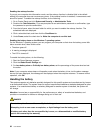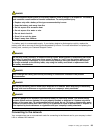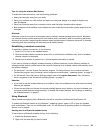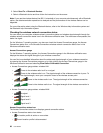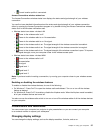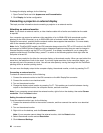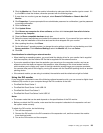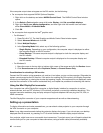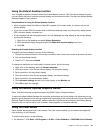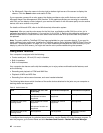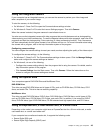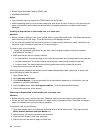
If the computer output does not appear on the DVI monitor, do the following:
• For a computer that supports NVIDIA Optimus Graphics:
1. Right-click on the desktop and select NVIDIA Control Panel. The NVIDIA Control Panel window
opens.
2. In the Select a Task navigation pane at left under Display, click Set up multiple displays.
3. Right-click Verify your display conguration, and then right-click the monitor icon and select
either Clone Mode or Extended Mode.
4. Click OK.
• For a computer that supports the Intel
®
graphics card:
– For Windows 7:
1. Press Ctrl+Alt+F12. The Intel Graphics and Media Control Panel window opens.
2. Select Advanced Mode and click OK.
3. Select Multiple Displays.
4. In the Operating Mode eld, select any of the following options.
– Single Display: Depending on your conguration, the computer output is displayed on either
the computer display or the DVI monitor.
– Clone Displays: The same computer output is displayed on both the computer display and
the DVI monitor.
– Extended Desktop: Different computer output is displayed on the computer display and
the DVI monitor.
– For Windows 8:
1. Move the cursor to the top-right or bottom-right corner of the screen and click the Devices charm.
2. Click Second screen and select Duplicate, Extend, or Second Screen Only.
Considerations for attaching a DVI monitor
Connect the DVI monitor to the expansion unit, and turn it on before you turn on the computer. Otherwise the
system cannot recognize the DVI monitor. If the option for enabling the DVI monitor in the Display Properties
window is not displayed, try closing the window and opening it again. If the option still is not displayed, make
sure that the connector of the monitor is attached rmly, and repeat the procedure for attaching the monitor.
Using the Mini DisplayPort connector
Your computer has a Mini DisplayPort connector, a digital display interface for connection to various
external devices, such as CRT monitors, LCD monitors, projectors, or even high-denition televisions. This
compact connector enables a plug-and-play setup and supports adapters that can plug into DVI, VGA, or
HDMI connectors.
The Mini DisplayPort connector of your computer supports audio as well as video streaming.
Setting up a presentation
To display information and make presentations, you can attach a data projector to your computer through
the VGA connector on your computer.
Note: It may take several seconds before the projector displays the image. If you do not see your desktop
displayed after 60 seconds, try pressing Fn+F7 to switch between different display output locations.
Your projector might have one or more audio-input connectors. To project sound, you will need to attach the
combo audio jack on your computer to these connectors, using an audio cable (commercially available).
40 User Guide



